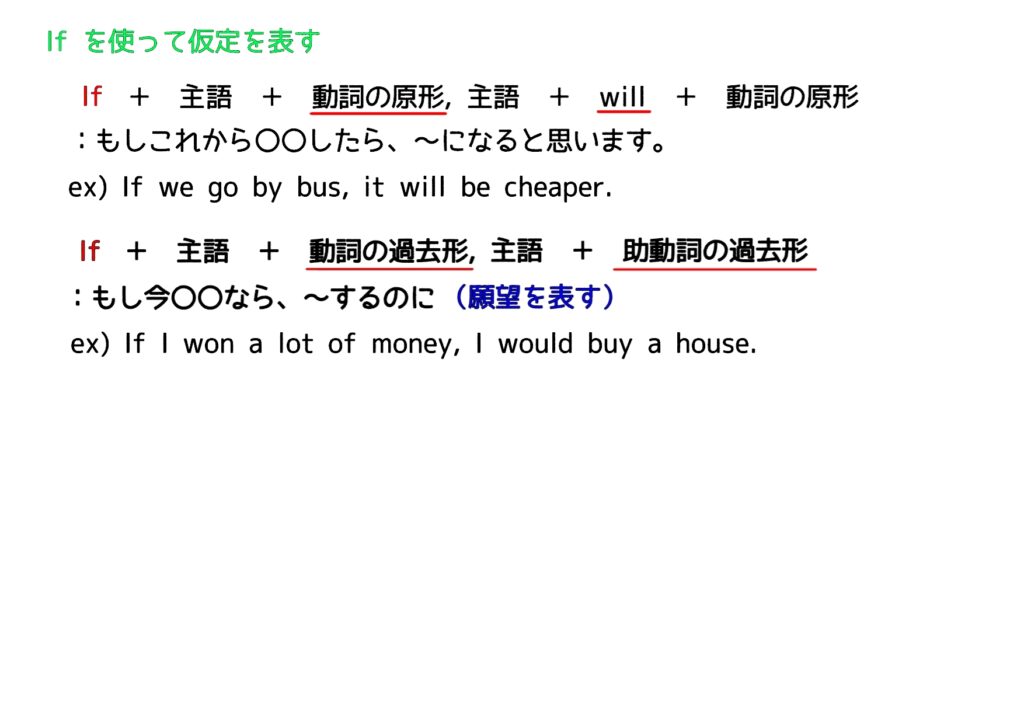第83回:ifの後に現在形を使ったり、過去形を使ったり。

仮定法は、時制やら何やら変わってしまうので、よく確認をしないといけません。
Q. この記事で、一番大事なことって何?
A. 大事なことを、1枚の画像にまとめました。

いちいちノートにまとめるのが面倒だという方、また、
ノートにまとめることが苦手だという方は、ご活用ください。

[広告]
確かな英語力は、日々の継続から。
その継続を後押しする、第二言語習得理論に基づいた
オンライン英語学習プログラムがあります。
英語を使う人のための、確実なスキルアップが望める
7日間の無料体験はこちらから!

現実的な条件文
- 現実的な条件文では、if節には未来を表す現在形の動詞を使うことが一般的です。
例: If you leave now, you’ll be able to catch the 5 o’clock train. - ただし、会話では現在形の代わりにbe going toを使うこともあります。
例: If I’m going to catch the train, I’ll have to leave now. - “If you’re leaving now…”と言ってもよいです。
- 提案や指示、アドバイスをする場合には、命令形を主節で使用することができます。
例: Take another sandwich if you’re hungry.
例: If you have a mobile phone, check that it is turned off.
- if節に現在形の動詞を使って特定の条件を導入することもできます。
- この場合、「if」は「when」と似た意味を持ちます。
例: The video pauses if you click on this button.
例: If age-related changes are taken into account, the conclusion remains the same.
- if節に現在完了形の動詞を使い、主節には将来形(will、現在進行形、be going to)を使って、将来の可能性のある出来事について話すことができます。
- 時には現在完了形や現在形を使うこともあります。
例: I’ll lend you War and Peace if I’ve finished it before you go on holiday.
例: If you haven’t paid the bill by Friday, we’re taking the carpets back.
非現実的な条件文
- 非現実的な条件文では、if節にif … were + to-infinitiveの形を使うことがあります。(if + 動詞の過去形は、想像している未来の状況について話す。(=願望))
例: If the technology were to become available, we would be able to expand the business. - ただし、状態を表す動詞(belong、doubt、enjoy、know、like、remember、understandなど)ではこの形を使いません。
例: If I knew they were honest, I’d gladly lend them the money.
- if it was not for + 名詞句(またはより正式にはif it were not for + 名詞句)を使い、1つの状況が他の状況や人に依存していることを表現します。
- 過去の話の場合、if it had not been for + 名詞句を使うこともできます。
例: If it wasn’t for Nina, the conference wouldn’t be going ahead.
例: If it hadn’t been for Dad, I wouldn’t have gone to college. - 形式的な言語では、Were it not for…やHad it not been for…を使うこともあります。
例: Were it not for Nina…
例: Had it not been for Dad… - 類似の意味を持つ表現としては、but for + 名詞を使うこともあります。特に形式的な文脈で使用されます。
例: The village school would have been closed years ago but for the determination of teachers and parents to keep it open.
具体例
- Real conditionals:
- If she goes to bed early tonight, she’ll be well-rested for the exam tomorrow. (present tense)
- If we’re going to catch the bus, we should leave now. (be going to)
- Conditional conditions:
- The lights turn off automatically if you leave the room. (if has a similar meaning to when)
- If safety precautions are followed, accidents can be prevented.
- Possible future events:
- I’ll lend you the book if I’ve already finished reading it before you leave. (present perfect)
- If you haven’t submitted your application by Friday, you won’t be considered for the scholarship. (present perfect or present simple)
- Unreal conditionals:
- If I were to win the lottery, I would travel the world. (imaginary future situation)
- Would it be possible for you to help me if I were to ask for your assistance? (making a polite suggestion)
- If it was not for / if it hadn’t been for:
- If it wasn’t for my sister’s support, I wouldn’t have overcome the challenges. (dependent situation)
- If it hadn’t been for my professor’s guidance, I wouldn’t have excelled in my research. (past situation)
Formal language:
- Were it not for his expertise, the project would have failed.
- Had it not been for their generosity, we wouldn’t have been able to fund the event.
But for:
- But for their dedication, the project would have been abandoned.
[広告]
TOEICのスコアを上げたいけれど、
まとまった勉強時間が取れなくて困っている…
なら、細かいスキマの時間を使いながら、
少しずつスキルを積み重ねてみてはどうでしょう。
スマホ1つでスコアアップが出来る、
オンライン講座のリンクはこちらから。

Q. この文法はどうやって使うのでしょうか?
A. 今回の文法を活用した会話文を見てみましょう。

Hey, do you think we’ll make it in time for the movie if we leave now?
(ねえ、今出発したら映画に間に合うと思う?)

If we leave now, we should be able to catch the 7 o’clock show.
(もし今出発すれば、7時の上映に間に合うはずだよ。)

Alright, let’s go then. I don’t want to miss the beginning.
(そうだね。じゃあ行こう、始まりを逃したくないから。)

Wait, I need to grab my jacket first. If I’m going to sit in an air-conditioned theater, I’ll get cold.
(ちょっと待って、ジャケットを取らなきゃ。冷房の効いた映画館で座るなら、寒くなるから。)

Hurry up, we don’t have much time!
(早くしないと、時間がないよ!)

I’m coming, just give me a second.
(もうちょっと待って、すぐ行くから。)

If you have your mobile phone, check if the movie theater is showing any other films we might be interested in.
(もし携帯電話持ってるなら、映画館で他に興味のある映画をチェックしてみて。)

Good idea. If they have any interesting options, we can plan for another movie night soon.
(いいアイデアだね。もし面白そうな選択肢があれば、別の映画にしても良いね。)

Definitely. Let’s keep our options open.
(うん。選択肢は広げておこう。)

Alright, I’m ready. If we’re going to enjoy this movie, we better get going now.
(いいよ、準備できたよ。この映画を楽しむために、さっさと出発しよう。)

Agreed. Let’s hit the road!
(賛成。出発しよう!)
[広告]
ロゼッタストーン・ラーニングセンターで、最先端の教育制度を活用して英語を学びませんか?私たちは個々の学習ペースに合わせてeラーニングと対面教育を組み合わせ、柔軟な学習環境を提供しています。自宅でのeラーニングと対面教育のメリットを最大限に活かし、あなたの英語学習をサポートします。最新のテクノロジーと個別の指導が組み合わさった当センターで、自由な学習スタイルを体験してみませんか?英語学習を楽しく効果的に進めるための環境がここにあります。新たな一歩を踏み出して、新しい英語学習の旅に参加しましょう!

Q. この記事の要点は?
「if」を使った仮定法の使い方を確認しました。
If 1: Real conditionals
- Present tense verbs are used in the if-clause to talk about future possibilities.
- In conversation, “be going to” can be used instead of a present tense verb.
- Imperatives can be used in the main clause for offers, instructions, or advice.
If 2: Conditions for truth
- Present tense verbs in if-clauses can introduce conditions similar to “when.”
If 3: Possible future events
- Present perfect verbs in the if-clause can be followed by future forms in the main clause.
- Present simple can also be used in the if-clause to express future possibilities.
If 4: Unreal conditionals
- “If … were + to-infinitive” is used to discuss imaginary future situations, especially when it is unlikely to happen.
- This pattern is sometimes used for polite suggestions.
If 5: Dependency and past situations
- “If it was not for + noun phrase” is used to express dependency on another situation or person.
- “If it had not been for + noun phrase” is used to talk about past situations.
- “Were it not for…” and “Had it not been for…” can be used in formal language.
- “But for + noun” can also be used with a similar meaning in formal contexts.
英会話を始めてみたいけれど、どのサービスが良いか分からない…
そんな方は、まず、この記事で3つのサービスを比べてみてはいかがでしょうか?
英語力を効率良く伸ばすことができるサービス3選です。

次回の文法解説は?
「もし、万が一…」を表すときには。
この記事を作る際に参考にした文法の解説書になります。
すべて英語で書かれていますが、練習問題が付いてます。
イギリス英語なので、スペル等の表記が異なる部分もありますが、
「使い方を練習したい」「繰り返し問題を解きたい」
という方は、使ってみても良いかもしれません。

関連記事一覧
他の文法解説記事を検索できます。







-320x180.jpg)




コメント